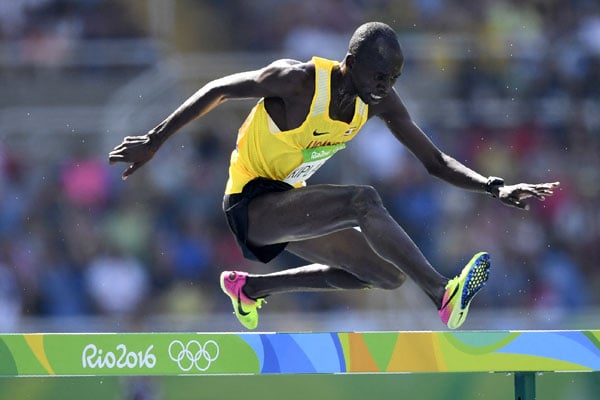Prime
Ruto slams Rwanda over border closure
What you need to know:
- The Munyonyo summit, organised by Africa Strategic Leadership Centre, a Ugandan think tank, is being attended by more than 800 delegates from across the continent, among them leading youthful entrepreneurs, government and business executives.
- Prior, the President had warned that Africa loses a lot of revenue in form of capital flight because some Africans are not using technology for commercial uses.
KAMPALA. Kenya’s Deputy President William Ruto Tuesday criticised the imposition of non-tariff barriers by some East African Community member states, singling out the closure of international borders as “retrogressive”.
Speaking in Kampala a day after Kenya’s President Uhuru Kenyatta made whirlwind trips to Kigali and Kampala, in the wake of diplomatic stand-off between Uganda and Rwanda, Mr Ruto wondered why leaders in the region said the right things, but acted the other way.
“We are seeing cattle of people being auctioned when they cross some borders…others are banning chicken while some EAC member countries are closing their international borders,” the Kenyan Deputy President said.
He added: “The discussion we should be having should be over the East African federation; that is the discussion we should be having. We should not be discussing closing borders. That in my opinion is a retrogressive discussion.”
In 2017, Tanzania auctioned more than 1,000 cattle belonging to Kenyan pastoralists which had trespassed into his country. Tanzanian President John Magufuli then said his administration would not spare foreign livestock finding its way into Tanzania. He said his country had for long been made a grazing field by neighbouring pastoral communities who have encroached on some parts of Tanzania’s parks denying his nation tourism revenues.
In 2018, Tanzania said it could not import poultry or livestock from Kenya or any EAC country, unless Tanzanian veterinary officers had tested them.

Heads of state. Left to right: President Museveni delivers his speech at the Africa Now Summit 2019 at Speke Resort Munyonyo in Kampala. Looking on are Minister of trade for Egypt Amr Nassar, President of Somalia Mohammad Abdulahi Mohammad, Deputy President of Kenya William Ruto, Vice President of Tanzania Samia Hassan Suluhu and Chairman Africa Strategic Leadership Center Robert Mwesigwa. PHOTOS BY ABUBAKER LUBOWA
The law
East African Community (EAC) treaty allows regional countries to allow the sharing of veterinary services.The Mutual Recognition Agreement (MRA) for East African Vets makes it possible for any EAC country to import poultry or livestock, as long as they have been tested by a veterinary professional from any of the signatory countries.
Mr Ruto, who flew in to attend the Africa Now 2019 conference underway at the Commonwealth Resort Munyonyo, did not name any country. The region, however, has been grappling with the row between Uganda and Rwanda that exploded on February 28 when Kigali abruptly shut its busiest border post at Katuna to commercial vehicles from Uganda.
It followed with public accusations that Uganda was home to dissident elements plotting against President Paul Kagame’s government and banned Rwandans from entering Uganda, claiming they risked arrest and detention.
Uganda’s Foreign Minister Sam Kutesa dismissed the yet-unproven allegations as made-up, and he yesterday reiterated that Kampala was invested in a stable neighbouring Rwanda.
“We cannot allow Rwanda to be disorganised by any negative forces and Rwanda is one of our neighbours and that is our position,” Mr Kutesa said at a separate press conference in Kampala he held jointly with his visiting Hungarian counterpart Péter Szijjártó.
The Munyonyo summit, organised by Africa Strategic Leadership Centre, a Ugandan think tank, is being attended by more than 800 delegates from across the continent, among them leading youthful entrepreneurs, government and business executives.
Also in attendance is Somalia’s President Mohamed Abdullahi Mohamed, Tanzanian Vice President, Samia Hassan Suluhu and the Egyptian trade minister Amr Nassar, who represented President Abdel Fattah el-Sisi, the African Union chairman.

Queen. Miss World Africa Quiin Abenakyo, attends the Africa Now Summit at Munyonyo, Kampala on March 12, 2019.
At the conference, Deputy President Ruto lavished his host, President Museveni, with praise as East Africa’s “father figure” and role model.
He said: “Your Excellency, you are a father figure in our region; we are looking up to you for leadership. You are the mzee (elder) and you cannot run away, you cannot escape from responsibility. I’m telling you this as your son. You have to provide leadership for East Africa to march forward. We cannot afford to roll back from the gains we have made as East Africans.”
Mr Museveni gestured cheerily. Prior, the President had warned that Africa loses a lot of revenue in form of capital flight because some Africans are not using technology for commercial uses.
He said many mobile phone subscribers spend a lot of credit on conversations that bring no cash in their pockets while enriching the telephony service providers.
Mr Museveni cited the South African Mobile Telecommunication Network (MTN), whose chief executive officer Rob Shuter was in attendance, to explain how infatuation with high tech gadgets is consumptive and can haemorrhage a country’s foreign exchange earnings when investors repatriate profits in hard currency.
“The telephone companies like his [Shuter’s], the MTN, you find the villagers spending the whole day on phone talking…aunties telling those in town how their backs are paining. How much have you made out of such calls? Meanwhile, he [Shuter] is billing you,” he said.




